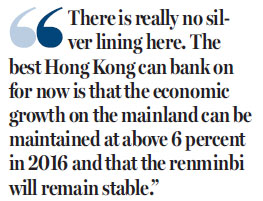Hong Kong banks prepare for gloomier prospects
Updated: 2016-02-17 08:23
By Peter Liang(HK Edition)
|
|||||||||
The Hong Kong stock market tumbled a total of about 4 percent in two days on resumption of trading after the long Lunar New Year holiday break. The lead indicator was dragged down by the heavyweights, particularly HSBC Holdings, or the "great elephant", as the bank is affectionately called. This is because of its large weighting among the constituent stocks of the Hang Seng Index.
HSBC, of course, is not the only bank whose earning prospects are brought into question by analysts and investors at a time of sub-zero interest rates, including in Europe and Japan, in which it has large exposure. Some other banks, particularly the large European institutions, have fared considerably worse.
The share price of Deutsche Bank, one of the largest financial houses in Germany, had dropped more than 40 percent since early 2015, prompting the bank to buy back some of its bonds to allay market concern about its financial health. Deutsche's share price rebounded nearly 10 percent on the day the debt buyback was announced.
To be sure, the financial strength of HSBC, which, together with its subsidiary Hang Seng Bank, dominates the banking market in Hong Kong, was never brought into question. But the prospects of the London-domiciled bank holding company that has a large presence in Europe look anything but bright. (HSBC announced on Sunday it had decided against moving its global headquarters back to Hong Kong.)
Investor sentiment was further depressed by earlier reports that the bank was to freeze staff salaries in order to cut costs. The bank tried to fudge the news by saying it would continue to expand in promising markets. That did not seem to make much of an impression on investors who kept on selling down the bank's shares.
Indeed, the global environment is hard on banks. The European Union and Japan are leading the way in cutting interest rates to stimulate economic growth and combat deflation with cheap money.
At one time, many economists drew a line which denoted how far interest rates could be cut. But that line was crossed long ago as some central banks trimmed rates to levels approaching zero. In recent months, the central banks of some economies, including Japan, Denmark and Switzerland, have pushed rates into negative territory. This means that banks in these jurisdictions have to pay to deposit money in those central banks even for keeping the minimum reserve balance.
Low interest rates are bad for banks because they help to squeeze their profit margins by narrowing the spread between lending and deposit rates. The situation gets significantly worse when the rate set by the central bank sinks below zero.
It is hard to imagine that many depositors would want to pay for the privilege of depositing their money in banks. Competition would make it hard for banks to vastly trim deposit rates while they have to compete between themselves for borrowers by cutting lending rates. Under such circumstances, it does not take a lot of insight to conclude that banks are having a tough time.
In Hong Kong, the economic downturn poses the usual set of problems for banks. But the Hong Kong Monetary Authority (HKMA) is constrained by the linked exchange rate system in the use of interest rates as a monetary tool for economic adjustment. In fact, the weakening Hong Kong dollar against the greenback to which it is pegged could require the HKMA to raise interest rates later this year.
That is not necessarily good news for banks because higher rates could further depress the economy and the property market. Average home prices have already dropped about 10 percent from the peak of a year earlier.
Nobody seriously questions the financial solidity of Hong Kong banks, which are under the close supervision of the HKMA. The financial watchdog has taken measures to ensure that banks are sufficiently capitalized to weather any foreseeable contingency. But the global economic environment is such that many banks will find it increasingly difficult to maintain earnings growth.
There is really no silver lining here. The best Hong Kong can bank on for now is that the economic growth on the mainland can be maintained at above 6 percent in 2016 and that the renminbi will remain stable.
As it is, Hong Kong and the mainland will provide the best opportunities for international banks to grow their businesses.
The author is a veteran current affairs commentator.

(HK Edition 02/17/2016 page10)